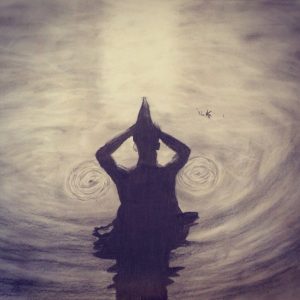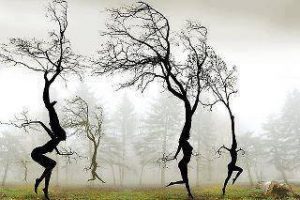 Our Moving into Meditation class focused on the very human experience of not wanting things to be the way they are. Our “not wanting” things to be as they are often adds anguish to life’s inevitable challenges. We explored how We Can’t Get No Satisfaction, the third chapter title of Toni Bernhard‘s book: How to Wake Up: A Buddhist Inspired Guide to Navigating Joy and Sorrow. We drew inspiration from Jack Kornfield’s book, No Time Like the Present: Finding Freedom, Love and Joy Right Where You Are. Jack offers suggestions we can use to free ourselves from ways of thinking that narrow our choices and keep us stuck. Poet Jane Hirshfield ‘s words – imaginative and playful – invoke creative ways of accepting life just as it is.
Our Moving into Meditation class focused on the very human experience of not wanting things to be the way they are. Our “not wanting” things to be as they are often adds anguish to life’s inevitable challenges. We explored how We Can’t Get No Satisfaction, the third chapter title of Toni Bernhard‘s book: How to Wake Up: A Buddhist Inspired Guide to Navigating Joy and Sorrow. We drew inspiration from Jack Kornfield’s book, No Time Like the Present: Finding Freedom, Love and Joy Right Where You Are. Jack offers suggestions we can use to free ourselves from ways of thinking that narrow our choices and keep us stuck. Poet Jane Hirshfield ‘s words – imaginative and playful – invoke creative ways of accepting life just as it is.
Guided Relaxation
Welcome and relax. Feel yourself simply being . . . the sense of time ebbing and flowing . . . Tuning into the space inside you . . . notice your feelings, your sensations, your thoughts . . . openly witnessing . . . . curiously witnessing . . . Noticing expressions of the body, the heart, the mind . . . hard or soft . . . tense or relaxed . . . closed or open . . . resistant or yielding . . . What are they communicating? How are you responding? How are you receiving your very being in this moment right now?
 Tune in to the space around you, imagine the space outside, the land and water bodies enveloping the planet . . . Feel the vastness of the sky and of the space that holds the moon and planets and galaxies. Feeling such spaciousness – can you sense how everything has its rhythm? All of life arriving and departing, flourishing and struggling . . . coming to be and then fading away. . . . We are a part of it all . . .
Tune in to the space around you, imagine the space outside, the land and water bodies enveloping the planet . . . Feel the vastness of the sky and of the space that holds the moon and planets and galaxies. Feeling such spaciousness – can you sense how everything has its rhythm? All of life arriving and departing, flourishing and struggling . . . coming to be and then fading away. . . . We are a part of it all . . .
We share stress and struggle . . . currents of uncertainty and unease that flow through our lives . . . the third mark of our human condition. Every life a mixture of joy and sorrow.
Through mindfulness practice we come to a broader understanding of suffering. We can begin to free ourselves from the painful reactions we have to inevitable and unpleasant life experiences: illness, aging, grief of separation and loss. How do you respond to an unpleasant experience? It is easy to get carried away in a river of escalating distress, to retreat or withdraw from difficult circumstances.
Toni B. suggests that simply acknowledging an unpleasant experience is itself a moment of awakening – a way of engaging life as it is in the moment. This recognition can be a profound heart opening. This open heartedness enables us to experience healing states of mind: kindness, compassion, appreciative joy and equanimity . . .
 Reflect on your life at this moment. What dissatisfies you? Big issues over life’s meaning? . . . Vulnerability to the effects of climate change? Serious illness of loved one? The stresses of every day life: relationship issues, financial difficulties, job stress? Most of us try to adjust our day to day circumstances to be more to our liking. Our happiness becomes contingent on life conforming to how we think it should be. We try to control life’s circumstances and become unhappy when we fail.
Reflect on your life at this moment. What dissatisfies you? Big issues over life’s meaning? . . . Vulnerability to the effects of climate change? Serious illness of loved one? The stresses of every day life: relationship issues, financial difficulties, job stress? Most of us try to adjust our day to day circumstances to be more to our liking. Our happiness becomes contingent on life conforming to how we think it should be. We try to control life’s circumstances and become unhappy when we fail.
Part of us knows that pleasant experiences won’t last and unpleasant experiences will arise, often most unexpectedly. Yet, as Toni B. writes: our continuing dissatisfaction can be hard to recognize because it’s often such an ordinary part of everyday life that we don’t see it even when it’s staring us in the face.
The world is simply the way it is. We can’t control the weather, our thoughts, our emotions.
 Our dissatisfaction can be so very subtle – it may be vague feelings of anxiety, dread or unease that don’t express themselves as complaint. Yet these states have signatures in our very bodies: muscle tension, queasy stomach, shallow breathing. The “intentionality” of mindfulness practice can help us learn to recognize the cues that signal our discontent.
Our dissatisfaction can be so very subtle – it may be vague feelings of anxiety, dread or unease that don’t express themselves as complaint. Yet these states have signatures in our very bodies: muscle tension, queasy stomach, shallow breathing. The “intentionality” of mindfulness practice can help us learn to recognize the cues that signal our discontent.
We can work with our minds to lessen suffering in our lives. Poet Jane Hirshfield – a Zen practitioner, advises that the practice teaches us to say yes to everything at the deepest level, including the difficult. This poem drawn from her experience in monastic life expresses this affirmation of life.
A Cedary Fragrance
 Even now,
Even now,
decades after,
I wash my face with cold water—
not for discipline,
nor memory,
nor the icy, awakening slap,
but to practice
choosing
to make the unwanted wanted.
In his book, No Time Like The Present, Jack Kornfield reminds us that:
We are being carried on a luminous star, sharing in the dance of life with seven billion beings like us. Vastness is our home. When we recognize the spaciousness that is our universe, around us and within us, the door of freedom opens. Worries and conflicts fall into perspective, emotions are held with ease and we act amid troubles of the world with peace and dignity.
We are all on this human journey. Consider how many others are experiencing the change and loss we face? This broader perspective helps us to recognize what we are going through as part of life’s seasons. Jack asks “What would it feel like . . . to make our love bigger than our sorrows?” Like Toni, he also encourages us to open our hearts:
. . . The spacious heart reveals the spacious mind. . . . Your spacious mind is the natural awareness that knows and accommodates everything. . . . the silent witness, spacious consciousness . . “the One Who Knows”
Jack suggests we see our life as a movie . . . We sometimes get caught up in the plot. We can remember we are also the audience. We can breathe, pause and become witness to it all. He writes with such faith in this very human capacity:
 Rest in spacious awareness and feel the presence of love. . . . You become loving awareness itself. The freedom of loving awareness is available; it just takes practice for you to remember it and to trust that it is always here. When you feel lost, stuck . . . contracted or caught up, take a breath and visualize yourself stepping back. With a spacious mind you can witness even . . . contracted states and hold them in loving awareness. . . Let yourself open, merge into space and love. Relax and rest in the immensity that surrounds you, the immensity that is you. . . . witness it all, let loving awareness make room for everything: boredom and excitement, fear and trust, pleasure and pain, birth and death.
Rest in spacious awareness and feel the presence of love. . . . You become loving awareness itself. The freedom of loving awareness is available; it just takes practice for you to remember it and to trust that it is always here. When you feel lost, stuck . . . contracted or caught up, take a breath and visualize yourself stepping back. With a spacious mind you can witness even . . . contracted states and hold them in loving awareness. . . Let yourself open, merge into space and love. Relax and rest in the immensity that surrounds you, the immensity that is you. . . . witness it all, let loving awareness make room for everything: boredom and excitement, fear and trust, pleasure and pain, birth and death.
Our hearts as vast as the world – we can feel the landscape, the trees, the mountains, the ocean waters all arising in our hearts boundless space. Consider the space that Jane H. describes in her poem:
Metempsychosis
Some stories last many centuries,
others only a moment.
All alter over the lifetime like beach-glass,
grow distant and more beautiful with salt.
Yet even today, to look at a tree
and ask the story Who are you? is to be transformed.
There is a stage in us where each being, each thing, is a mirror.
Then the bees of self pour from the hive-door,
ravenous to enter the sweetness of flowering nettles and thistle.
Next comes the ringing a stone or violin or empty bucket gives off —
the immeasurable’s continuous singing,
before it goes back into story and feeling.
 In Borneo, there are palm trees that walk on their high roots.
In Borneo, there are palm trees that walk on their high roots.
Slowly, with effort, they lift on leg then another.
I would like to join that stilted trans-migration,
to feel my own skin vertical as theirs:
an ant-road, a highway for beetles.
I would like not minding, whatever travels my heart.
To follow it all the way into leaf-form, bark-furl, root-touch,
and then keep walking, unimaginably further.
What would you consider not minding that travels your heart?
